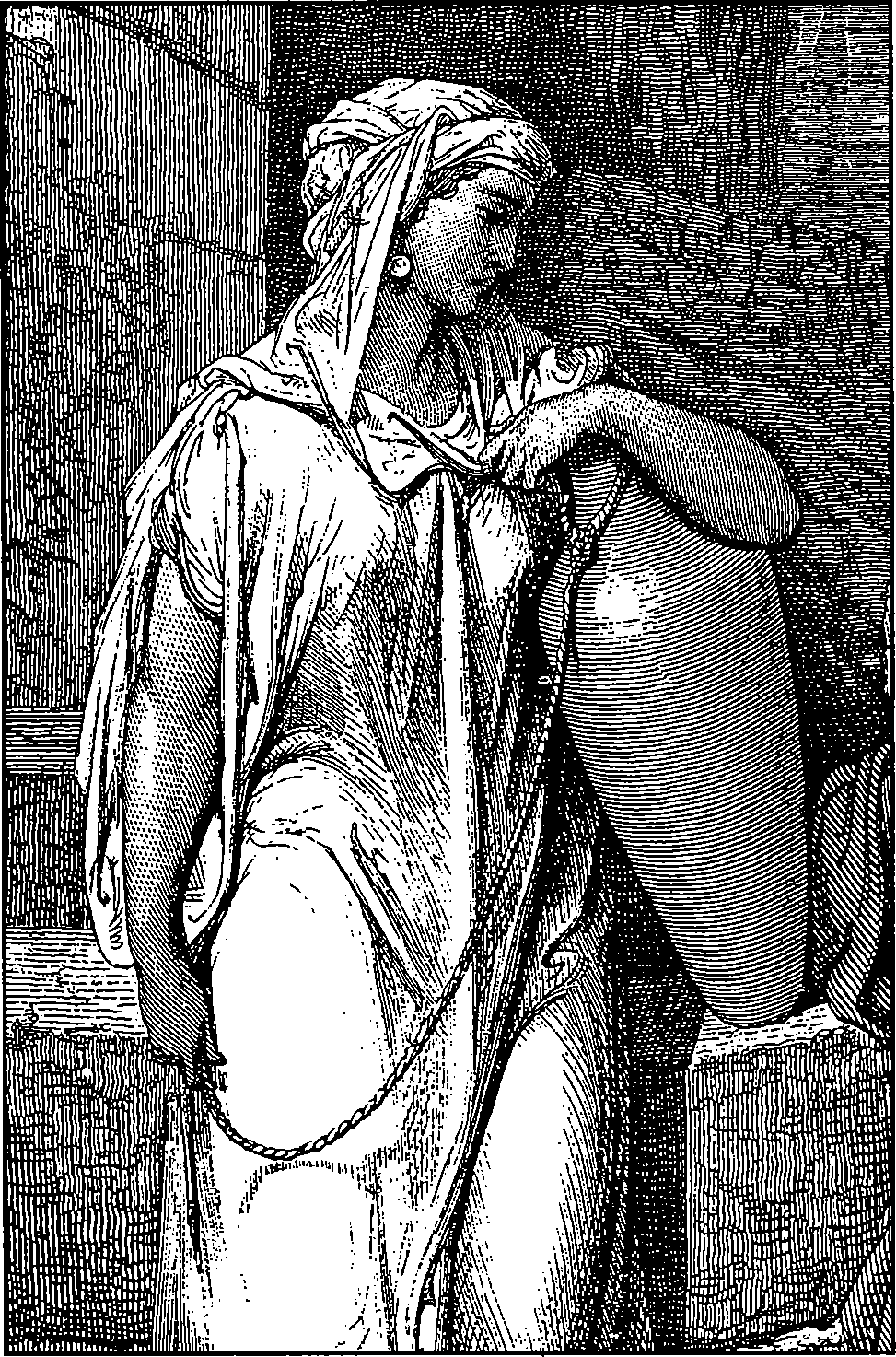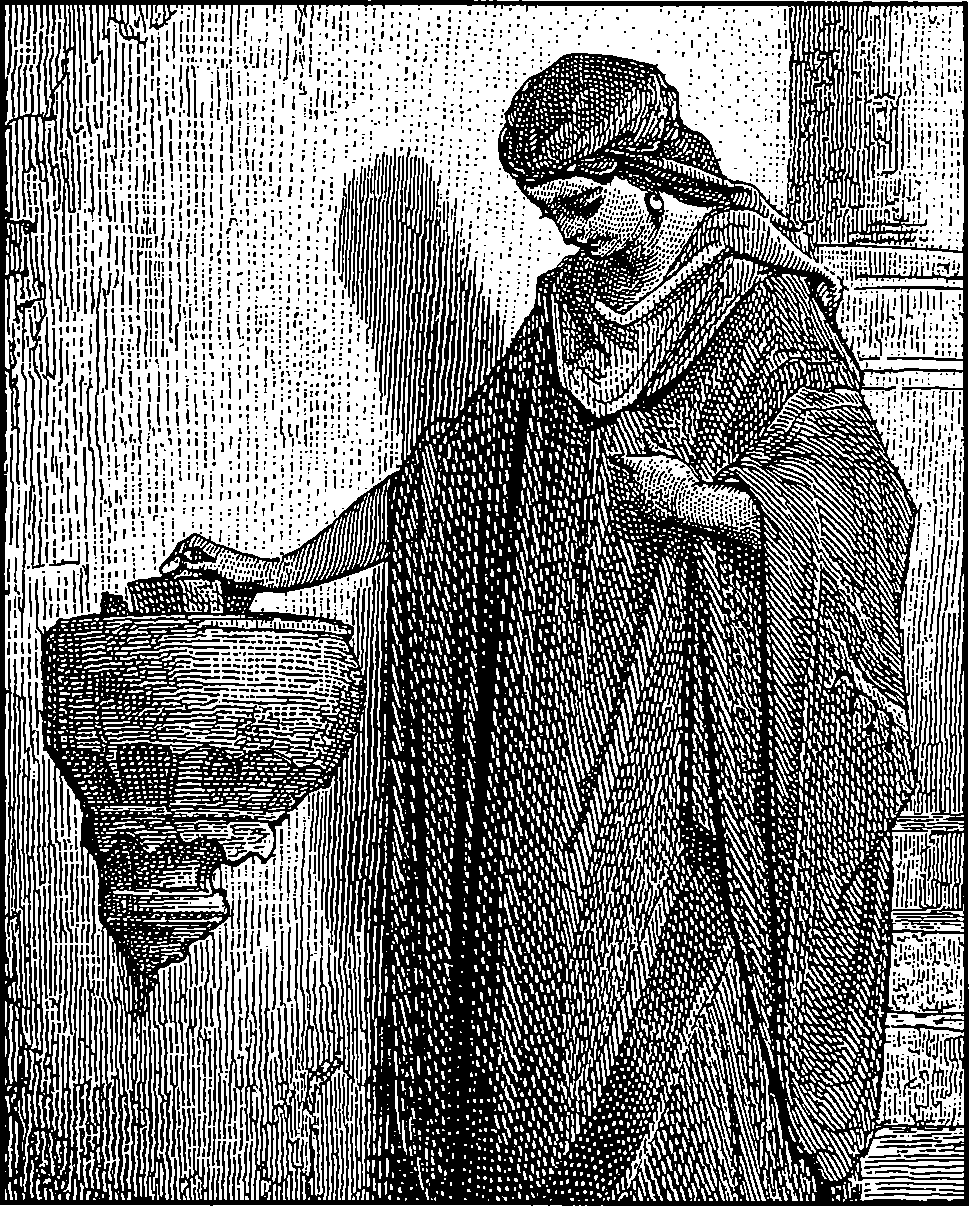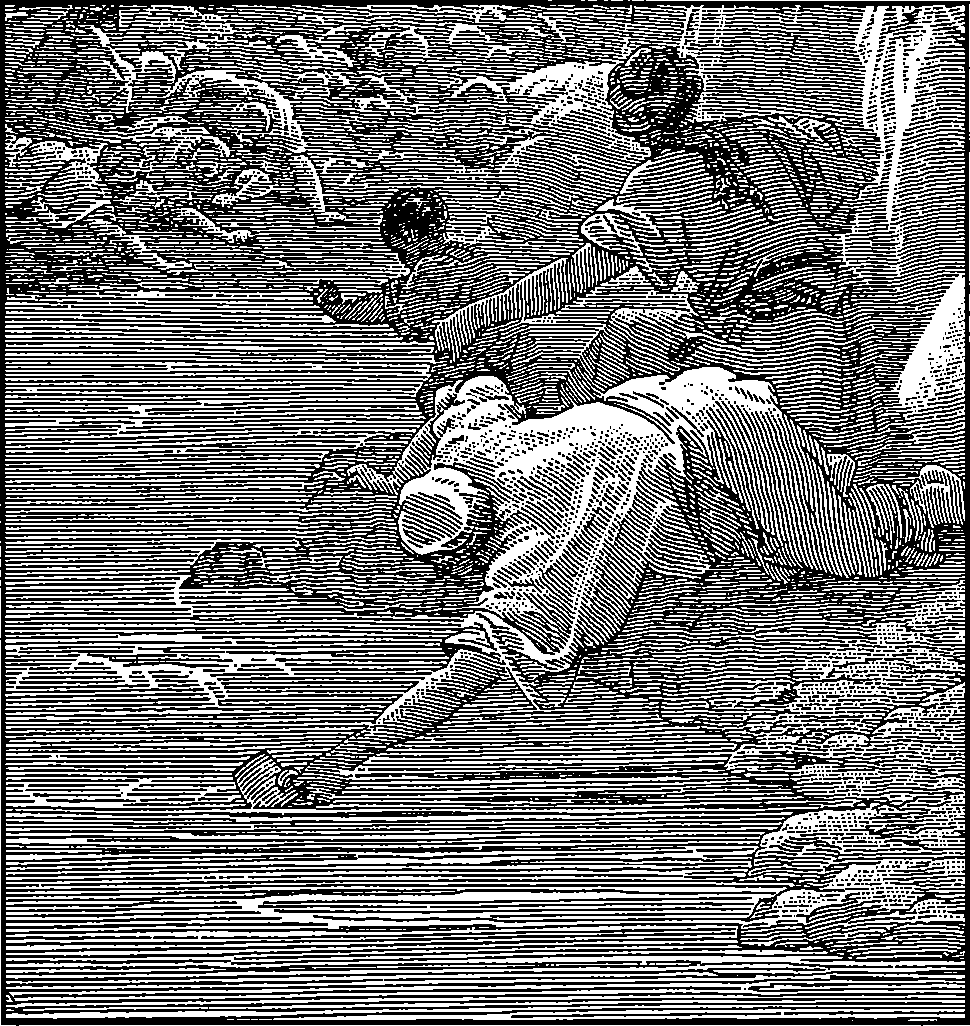The Samaritan Woman
The account of Jesus and the woman of Samaria who came to draw water, and was offered a taste of the “living waters,” is recorded inJohn4:l-29. Samaria was the name of a stretch of country located between Judea and Galilee, and while the Jews dealt with the Samaritans on a commercial basis, they had no intercourse with them socially or religiously but, rather, treated them as if they were Gentiles, that is, as “aliens from the commonwealth of Israel, and strangers from the covenants of promise, having no hope, and without God in the world” (Ephesians 2:12).
To better appreciate this incident with the Master, we need to understand a little background of the Samaritans. Their ancestors were Gentiles who had been transported to Samaria centuries earlier by the Assyrians even before Israelites had been taken to Babylon. Through contact with the Jews and also through intermarriage with certain renegade Jews, these Gentiles obtained a smattering of knowledge of the Jewish hope and worship and they combined this knowledge in a way that resulted in confusion. The time had not come for God to reveal Himself to the world or, in any sense of the word, to accept Gentiles.

The Samaritan Woman
Thus far, from the days of Jacob, all divine favor had been concentrated on Israel, the seed of Abraham – and particularly on those who had maintained their covenant relation ship by circumcision (Amos 3:2). Hence the Jews were right not to acknowledge the Samaritans, to have no dealings with them religiously or socially, nor to intermarry. This exclusivity was a matter not of bigotry but of divine regulation and prohibition (Deuteronomy 7:1-6, Ezra 10:10, 11).
The Samaritans gradually acquired a love for the land in which they were dwelling and its ancient history became their history. They realized that the Jews had been God’s favorite people but thought of them as being rejected from divine favor. And they thought of themselves as the successors of the Jews, not only in possessing the portion of the Israelites’ territory called Samaria but also, to some degree, in having the blessings of Abraham, Isaac, and Jacob. They accepted the five books of Moses (the Pentateuch) but rejected the remainder of the Old Testament Scriptures, which the Jews recognized..
An even greater religious antipathy existed between the Jews and the Samaritans than between the Jews and heathen peoples. One reason was that the Samaritan faith came closer to the Jewish faith and was, therefore, in some respects more actively antagonistic to it than the heathen religions, which permitted no competition. While the Jews regarded the Samaritans as impostors, as not the children of Jacob at all, the Samaritans called Jacob their father, thus convincing themselves that they were the children of Abraham and heirs of the oath-bound covenant.
JACOB’S WELL
Our Lord and his apostles, in their journey from Judea to Galilee, passed through the territory inhabited by the Samaritans. They had probably been on their journey for that day since early morning, and at noontime Jesus rested at Jacob’s well while the disciples went to a nearby village to purchase food. Water wells in Israel, as in many parts of the world, were comparatively scarce and Jacob’s well, dug approximately fourteen centuries before our Lord’s time, was a remarkably good well – deep, abundantly supplied with water, and nicely curved at the top. In fact, the well which was considered almost a miracle in its day, had a great reputation throughout the region because of the purity of the water. Samaria was a limestone country, so most of the water was brackish, but not Jacob’s well which, being sunk to a depth of over a hundred feet, had struck a crevice in the rock that yielded a very large and never-failing supply of desirable water.
While Jesus was resting on the well, a Samaritan woman came for water. The subsequent account of our Lord’s interview with her is one of the most extraordinary presentations of divine truth found in the Gospels. On a number of occasions Jesus made remarkable statements to not very remarkable people under not very remarkable circumstances. Jesus’ words have been an encouragement for all of his followers. Indeed we find that his principal communication through the Gospels has been with the humble. As the Apostle Paul said, “Not many wise men after the flesh, not many mighty, not many noble, are called” (1 Corinthians 1:26). Rather, God has chosen “the poor of this world rich in faith” to be heirs of the Kingdom Games 2:5). By His purposely taking the ignoble with a view of making them the noble, those who make their calling and election sure will reflect His glory and show forth His praise throughout all eternity as marks of His grace (Ephesians 1:5, 6, 2:10, 1 Corinthians 1:27-31).

“The poor of this world,” casting in her widow’s mite.
The Master at once recognized the woman as a Samaritan, and she immediately recognized him as a Jew – not merely by facial lineaments but also by distinctive features of his dress. So tightly were these lines of social etiquette drawn that under ordinary circumstances no self-respecting Jew would have asked a Samaritan for any favor, especially for a drink of water, which signified fellowship or a covenant of goodwill. Therefore, the narrative manifests the humility of our Lord. His request of the woman to allow him to have a drink of the water she had drawn was really a most tactful method of approach to her heart. By doing this, Jesus put himself, in a measure, under obligation to her. For a Jew to make a request or ask a courtesy of a Samaritan was very unusual. Consequently, the astonished woman inquired how it came that he, a Jew, would make such a request of a Samaritan. Her question contains an element of boldness – she acknowledges that she is not a virtuous woman – and all of these details make even more remarkable the fact that our Lord condescended to have any communication with this woman. A lesson along this line is found in the Apostle Paul’s advice that the Christian is to “condescend to men of low estate” (Romans 12:16).
JESUS’ KIND APPROACH
Jesus broke the icy barrier that existed between Jews and Samaritans. The Jews claimed superiority, and although the Samaritans did not acknowledge that superiority, they nevertheless felt it to some degree. The woman was ready to talk, but standing on her dignity she did not hasten to give the drink of water. Instead she parleyed and asked why a Jew of seemingly high character should act so differently from the custom. Why should he ask water of a Samaritan woman and, in a sense, be willing to place himself under obligation to one who was usually treated as inferior? The woman asked for an explanation of the Lord’s peculiar con duct, but he replied by attracting her attention to a deeper truth.
When our Lord sent forth the twelve apostles to declare that the Kingdom of God was at hand, he said to them, “Go not into the way of the Gentiles, and into any city of the Samaritans enter ye not: but go rather to the lost sheep of the house of Israel” (Matthew 10:5, 6). And on another occasion, he said, “I am not sent but unto the lost sheep of the house of Israel” (Matthew 15:24). Because Jesus would not perform his miracles to heal their sick, the Samaritans resented him and would not receive him or permit him to pass through one of their cities on his journey (Luke 9:51-56). The miracles that our Lord did were only intended to be sufficient to establish his identity. Their purpose was not to provide a precedent for healing the world or the Church. His words were, “The same works that I do, bear witness of me, that the Father hath sent me” (John 5:36). The Lord’s great healing time is designated in Scripture “the times of restitution” (Acts 3:21). When the Millennial Kingdom is inaugurated in the near future, then the healing of the nations will become Jesus’ great work (Matthew 6:10).
Our Lord’s course with the Samaritan woman is an illustration of the apostle’s instruction that we should do good unto all men as we have opportunity but especially to the household of faith (Galatians 6:10). Had there been a company of Jews to whom the Lord could have talked, we are bound to suppose that his energies would have been ex pended on their behalf to the neglect of this disreputable Samaritan woman. But there being none of the children of Israel to be fed at this time, he let some of the crumbs of knowledge and blessing fall to the Samaritans, who, like the Gentiles, were not children but in comparison were “dogs,” that is, household pets (Mark 7:27, 28).
Our Lord was obeying his own declaration that it was his “meat” to do his Father’s will and to be engaged in his Father’s business (John 4:34). Although he was weary, and although he knew that further talking would interfere with his rest and refreshment, he was ready, nevertheless, to sacrifice his own convenience to help another, even a social outcast. The Apostle Paul similarly exhorted all of God’s people to be instant in season and out of season in preaching the gospel message to willing ears (2 Timothy 4:2).
Jesus, while probably thirsty, was more anxious to give the water of truth than to receive the natural water. Instead of allowing himself to be sidetracked by the woman’s question on the rights and the wrongs of the Samaritans, he ignored her rudeness and turned the conversation by saying, “If thou knewest the gift of God, and who it is that saith to thee, Give me to drink; thou wouldest have asked of him, and he would have given thee living water” (John 4:10). The force of the expression “the gift of God” is only partly seen until we learn that these words were customarily used by the water carriers who went about the city and cried out in their own language, “The gift of God! The gift of God!” With water thus being termed “the gift of God,” the woman presumed our Lord’s meaning to be, “If you had known about the value of water, the gift of God, you would have asked of me.”

Precious water in the wilderness
The value of water is much more appreciated in the Asian countries than with us. To the inhabitants of those countries, water means the cooling and the refreshing of the blood, the cleansing of the skin, the comfort of life in every way. Thus “living water” is a wonderful and expressive symbol, and so is thirst. Thirst is a desire, a craving, a longing, and physical thirst is said to be more painful than physical hunger, for physical hunger loses its power gradually in weakness, but thirst continues and intensifies hourly until the very last breath. Just as literal water quenches and satisfies the demand of nature, so only the water of life can satisfy soul thirst. Along this line, we will quote an old poem:
Traverse the desert and then you can tell
What treasures exist in the cold, deep well.
Then you will learn what water is worth;
The gnawing of hunger’s worm is past,
While fiery thirst lives on to the last.
The hot blood stands in each gloomy eye
And “Water, oh God” is the only cry.
Let heaven this one rich gift withhold,
How soon we find it better than gold.
The woman understood the expression “living water” to mean fresh water as distinguished from stagnant water. Perceiving that our Lord was not provided with the necessary lowering bucket and camel’s hair cord, she said, “If you de sire to give me water to drink, it is useless for me to ask, for you have nothing to draw with and this well is very deep. Besides, there is no other place where you can procure better water than at this well. Whence, then, have you ‘living water?’ Are you greater than our father Jacob and his children and his cattle? Do the Jews have as good a well in their country? Father Jacob provided this well, and he knew of no better water for himself and his family. Are you able to pro vide better water? Are you greater than he?” John 4:11, 12, paraphrase).
DEEPER MEANING
Of course the woman did not discern any deeper meaning – how could she? Our Lord tactfully ignored her questions, not to deceive her or to take advantage of her but for her own benefit, leading her mind up from natural water to spiritual water. His answer was, “Whosoever drinketh of this water shall thirst again: but whosoever drinketh of the water that I shall give him shall never thirst; but the water that I shall give him shall be in him a well of water springing up into everlasting life” John 4:13, 14). Jesus thus assured her that the water he had to give was of a different kind, which not only would satisfy thirst for the time being but also would be a continual wellspring from within, ever giving satisfaction.
The woman now seemed to sense some kind of deeper attachment to the Master’s words, and her curiosity led her to exclaim, “Sir, give me this water, that I thirst not, neither come hither to draw” John 4:15). Under ordinary circumstances, the woman’s request would be considered very foolish indeed, but this was no ordinary circumstance. More over, her native humility shone forth – similar to that of Nathaniel when he responded in the affirmative to Philip’s invitation to “Come and see” whether Jesus was the Messiah John 1:45-49). Her humility was also like the humble curiosity of Zacchaeus when he ran and climbed a tree to view the Master in the way (Luke 19:1-4).
Of course the Samaritan woman did not grasp the meaning of our Lord’s words, nor could we have done so in the same situation. The well of truth from which our Lord gives us to drink is deep, and neither the Samaritan woman nor we have anything to draw with. However, we have been abundantly provided for under the new or gospel dispensation of the Holy Spirit. As the Apostle Paul declared, “The Spirit searcheth all things, yea, the deep things of God – that we might know [that is, that we might appreciate and be satisfied with] the things that are freely given to us of God” (1 Corinthians 2:10, 12).
The mind of the Samaritan woman swept forward in thought. She recalled the expectation of her people and of the Jews that God would send a great Messiah, an anointed One, who would be all wise and all powerful and would bring relief from all perplexity and complex issues in life. She wondered whether the Messiah could be more wonderfully wise than the prophet and teacher with whom she was talking. Not wanting to ask the question directly, she suggested it in a sideways fashion, saying, “I know that Messias cometh, which is called Christ: [and] when he is come, he will tell us all things” John 4:25). Seeing her readiness of mind, our Lord expressed to her, perhaps more plainly than to any other person during his ministry, the great fact that he was the Messiah: “I that speak unto thee am he” John 4:26).
The disciples, returning at this time, were surprised to find Jesus talking with a Samaritan woman, but they had too great respect to question him. Many since have marveled at the humility displayed by the Master, and the incident has been a good lesson that the Lord’s followers are not to despise opportunities for preaching the truth, even though they have an audience of but one. Indeed those possessed with the right spirit will feel richly blessed by such opportunities, which are nourishment to the soul and make them more appreciative of Jesus’ reply to his disciples: “I have meat to eat that ye know not of” (John 4:32).
If we, like the Samaritan woman, would like to drink of this deep well, then we have an obligation and a responsibility to procure these blessings. Throughout the Christian life we are to prayerfully seek more and more understanding of the precious truths in God’s Word, proving all things and holding fast to “that which is good” (1 Thessalonians 5:21). The principle applies not just at the beginning of our Christian walk but throughout and to the end of our course in the present life: “Blessed are they which do hunger and thirst after righteousness: for they shall be filled” (Matthew 5:6).
– Frank Shallieu
